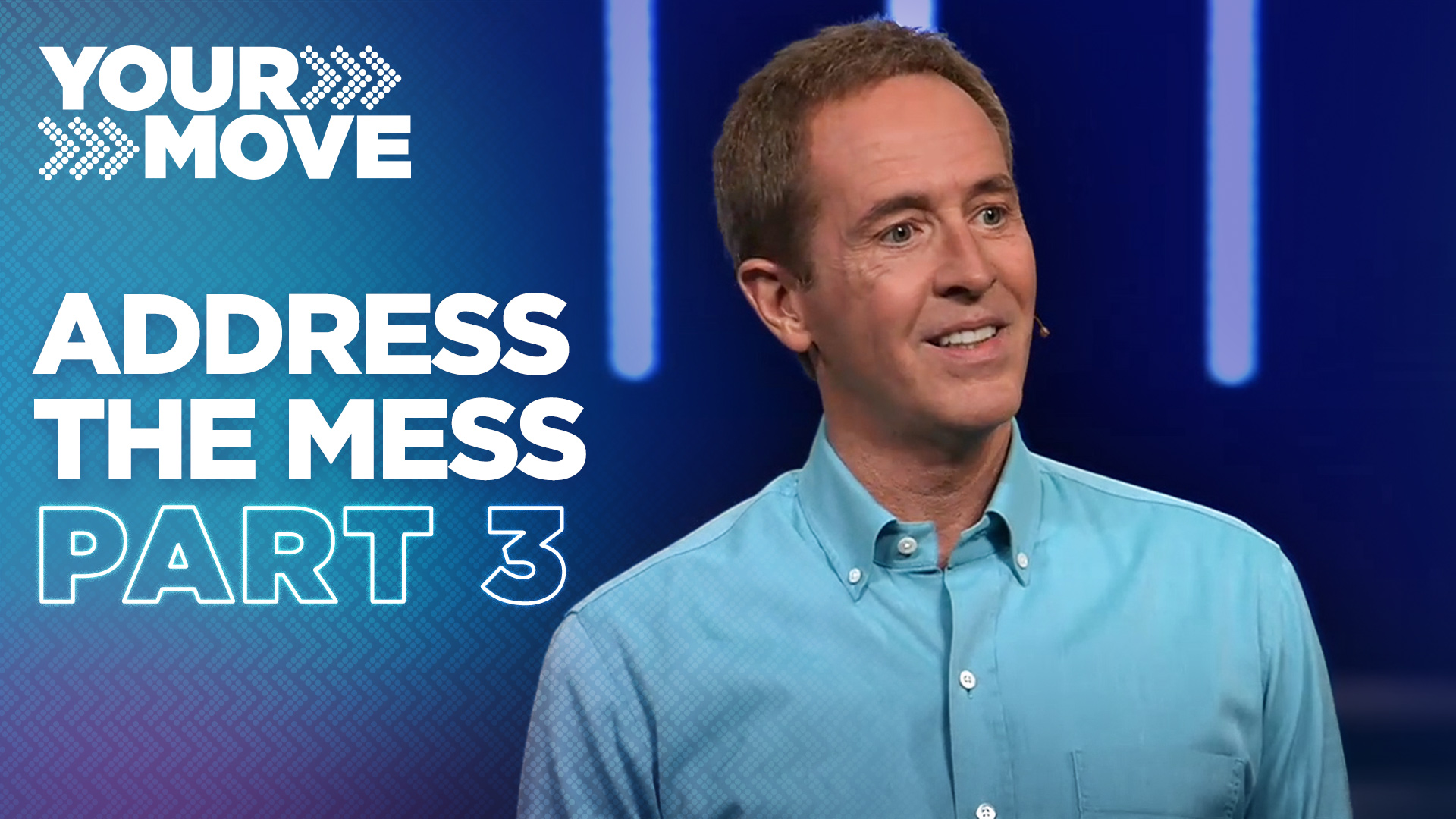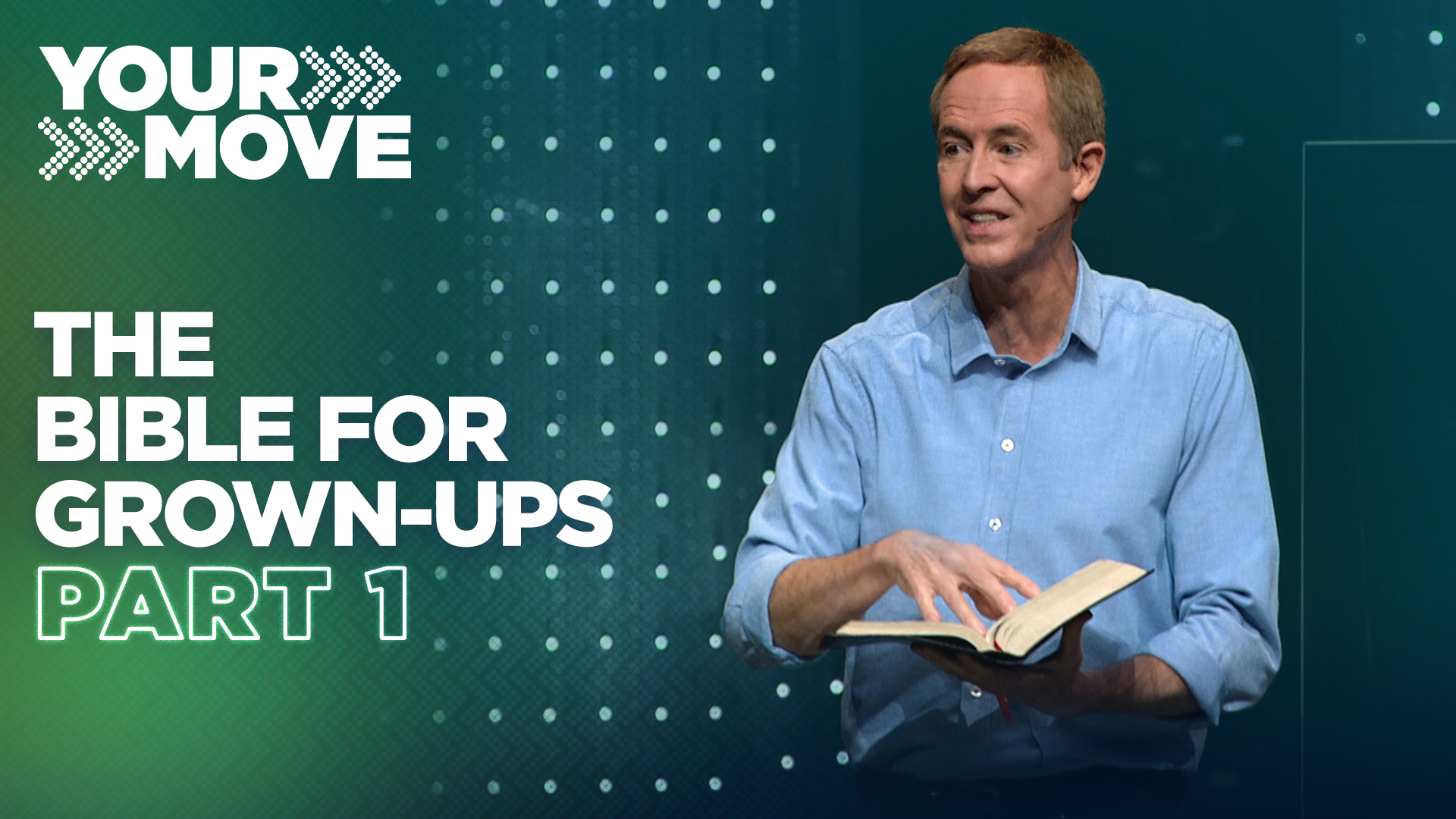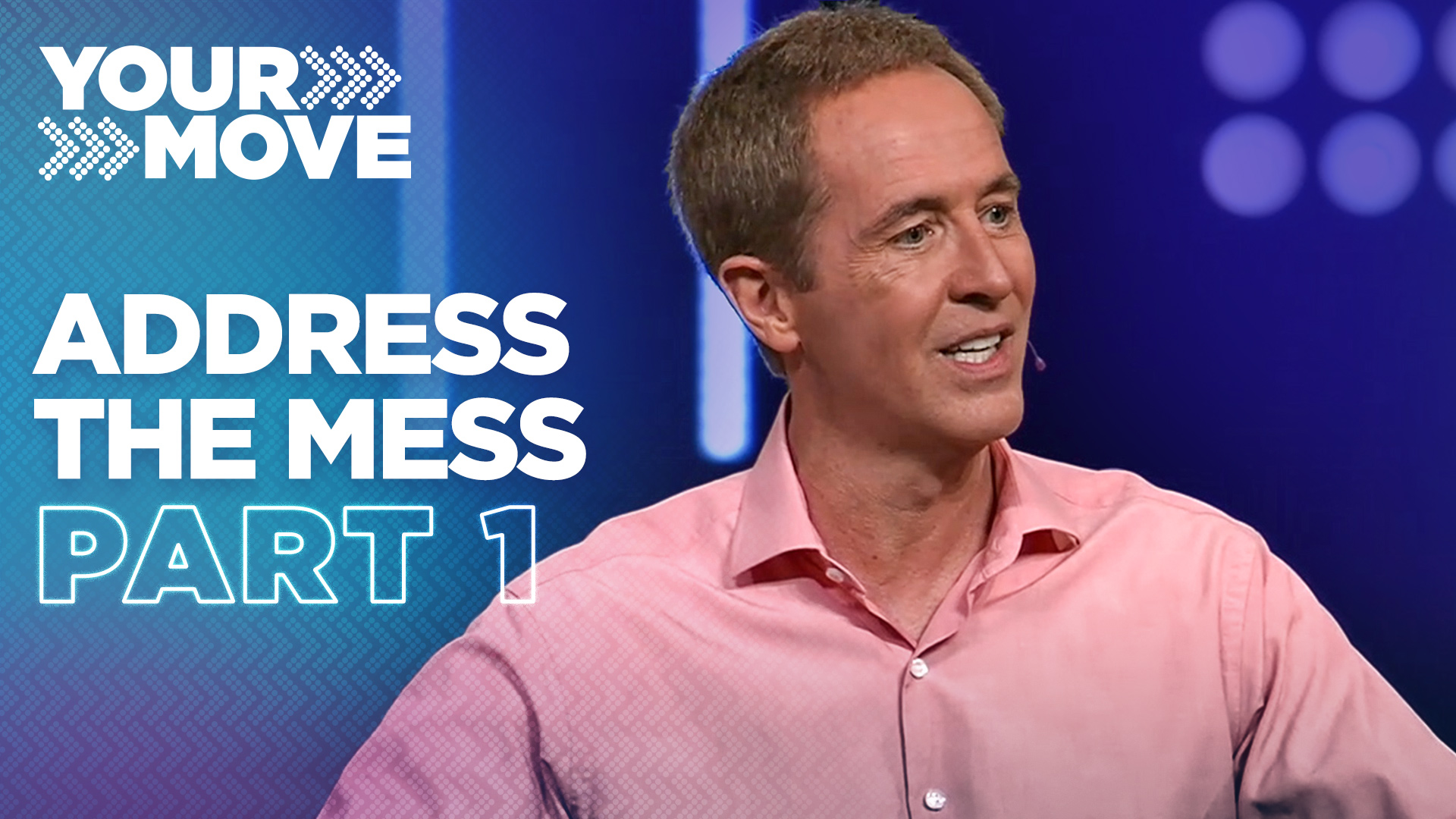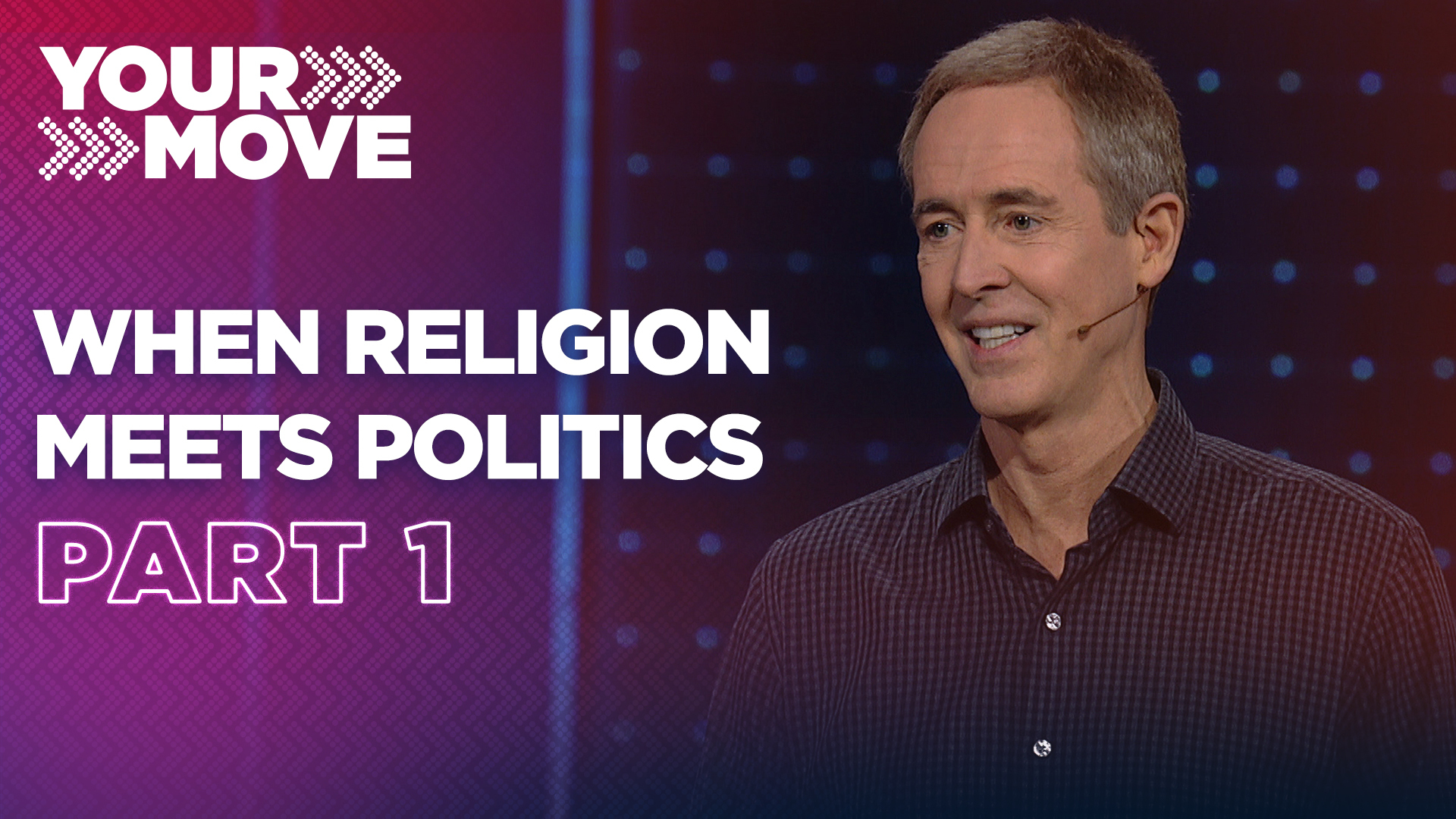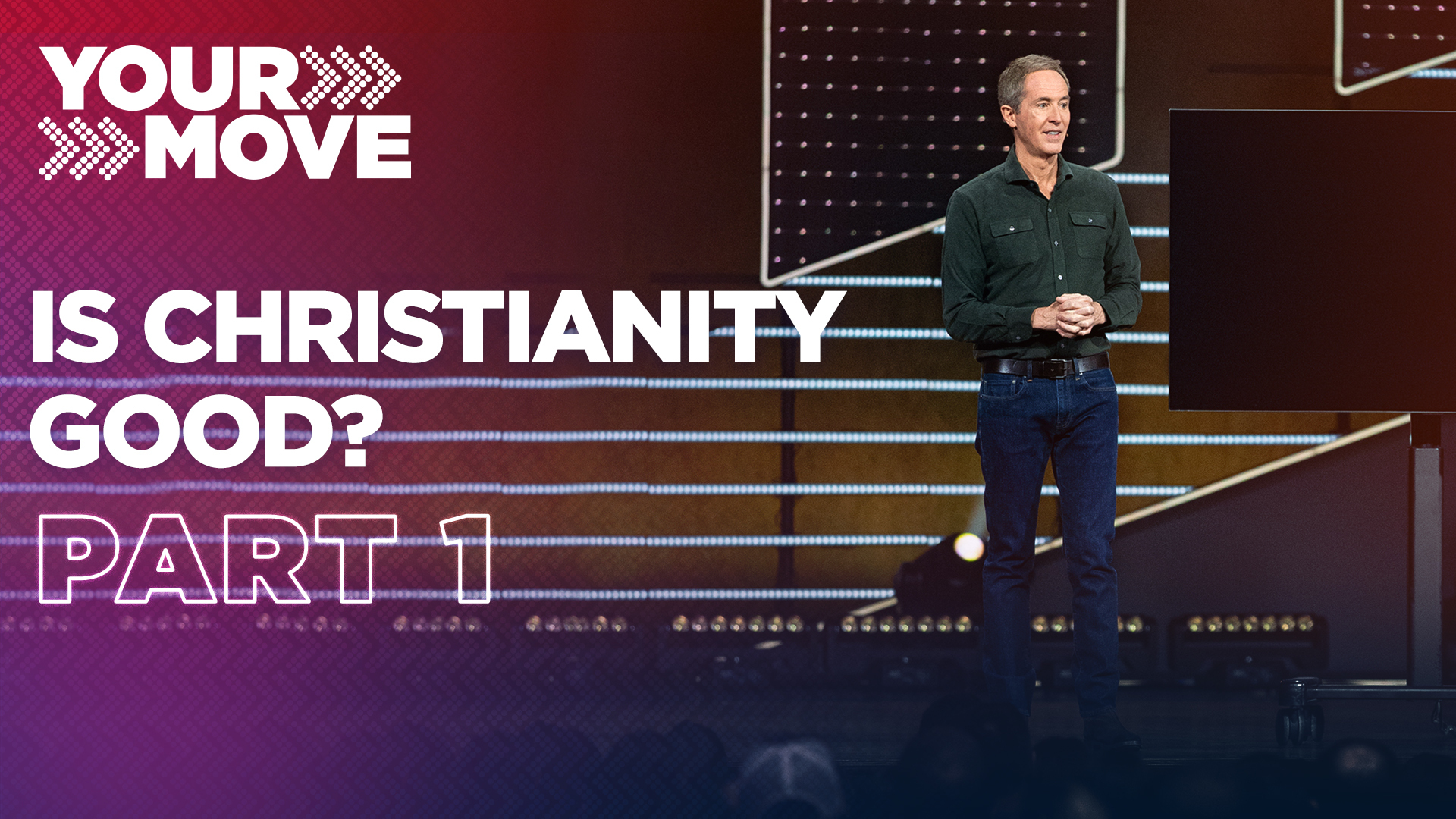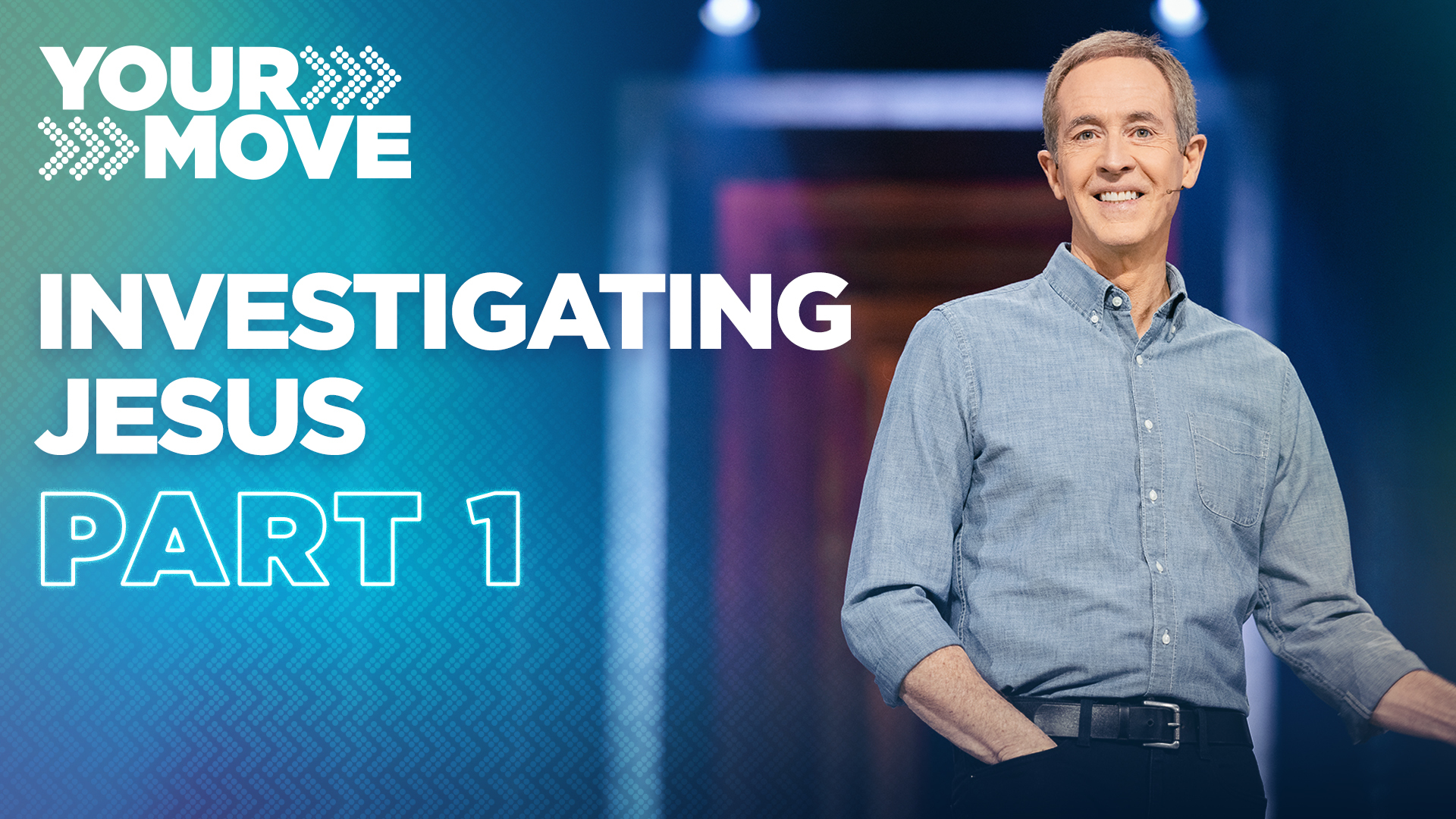We’ve all made a mess, been a mess, or experienced a mess. But could our messiness be just the thing that brings us closer to everyone in our lives?
- How do you usually respond when people you know are in messy situations?
- “Awareness of our messes awakens us to something outside of us to which we
are accountable.” Have you experienced this before? What, or who, helped you address the mess you were in? - Talk about a time when you fell short of your standards. What did you do to try to “clean up” the mess you made? Did it work?
- Has someone ever judged you because of a mess you were in? How did that impact your relationship with that person?
- Do you believe the messes in your life could actually bring you closer to those around you? How could this idea make your relationships better?
NOTE: The following content is a raw transcript and has not been edited for grammar, punctuation, or word usage.
Now, here’s a phrase you’ve heard many, many times before but I bet you didn’t know it had the history that it has. Because here’s a phrase that has been around for a lot longer than all of us and it’s this phrase right here, “Hot mess.” Did you know this phrase goes all the way back to the 19th century? And back in the 19th century… in fact, I’ll let you guess. What do you think in the 19th century “a hot mess” referred to? Anybody have any idea? Fire. No, no. Anybody… just wild guess? No. A hot mess referred to food like a mess hall or a mess kit. But then in the 21st century with the evolution of the word “hot,” a hot mess is actually defined as an attractive disaster. An attractive disaster. Somebody whose life is in obvious disarray and yet they remain somewhat functional and somewhat attractive. Someone whose life and some portion of their life is in disarray, things are just not going well, they have created a mess, they’re in a mess, a mess is happening around them, and yet they’re somewhat functional. They can still show up for work. They can still show up for school. And they look a lot better than their circumstances are.
So what that really means is that this is our goal in life, right here. This is your goal, right? In fact, you didn’t have the terminology necessarily, but this is what you do regardless of what’s going on at home. You show up at work and you smile. Because we’ve all got a mess going on somewhere in our lives, but we just clean up good. But that’s the nature of a hot mess.
Now, when we talk about messes in this series, we’re talking about all kinds of messes. Financial messes. You’ve gotten yourself in a financial mess because of debt or something that was beyond your control. And you said, “Oh, my finances are a mess.” Maybe a family mess. Marriage ain’t going so well or it was going well for a while and then something happened and you get in relational messes. You got health messes. Some of you have let your health go or maybe something beyond your control. Or you look in the mirror and you say, “Ugh, I’m just a mess.” At some point, wardrobe is not gonna be able to compensate for this, right? In any area of life. Professional mess, academically, your GPA. So there’s all kinds of messes.
2:23
And/or maybe you’re super blessed. Maybe you’re in this season of life where you are between messes. Life is good. It was just six months. We finally wrapped up a mess. And you know that’s just the way life goes. Or you’re one dumb decision away from creating a brand new mess. But the point is the thing we all have in common, whether you’re religious or Christian or some other religion, the thing we all have in common is life is just messy. But here is some good news ’cause we need some good news. The good news is simply this: there is always someone whose life is a bigger mess than yours. You can take great comfort in that. No matter how messy your life gets, there’s… actually, this is not good news, that’s actually mean.
Here’s the good news. The good news is simply this: it’s not just you. It’s not just you. It’s not just your life. It’s not just your family. It’s not just your marriage. It’s not just your GPA. Here’s what we’re gonna talk about for the next few weeks: mess is what brings us together today. And here’s why that’s so important to think about. It means when you see someone else’s mess or when you see somebody making a decision and you think to yourself, “You’re about to make a big mess of that” or, “You’re gonna regret that” or, “If you continue to do that, you’re gonna regret that” or, “If you continue to spin that way, live that way, if you continue to talk to your wife that way, if you continue to talk to your kids that way, you’re gonna create a mess.”
Before you are critical, you need to remember you’re a mess as well. And when it comes to the people around us whose lives are messy, we should be students, not critics. Because here’s something we all know: isn’t it true when you hear the story behind someone’s mess, you see them differently? When you hear the story and the circumstances about their mess and what created their mess and where they came from, isn’t it true you breathe a little deeply? You gotta sigh and suddenly you feel sorry for them. You’re more sorry for them than you are critical of them. As we explore this topic together and as we look at what Jesus had to say, we’re gonna discover we should be students rather than critics when it comes to other people because we’ve all been a mess.
4:24
The other reason this is so important is because sometimes you make a mess you can’t get out of by yourself. It’s a reminder we really, really, really need each other because we’ve all been in holes that were so deep and we looked up and we realized, you know what? “I realize I dug my own hole but I cannot get out of this by myself.” And if you ever had somebody step in and assist you when you’d made a mess or your life was upside down or you had a mess on your hands, it’s a reminder that that’s to be our response to people when we realize and discover they’re in a mess.
Imagine where the church would be today. Imagine where Christians would be today. Imagine the reputation of the church if we got that one thing correct. Now, here’s something that Christians believe as it relates to the mess. Here’s something that Christians believe. The Christians believe the mess that brings us together is the mess that brought God near. The mess that brings us together—the thing we have in common—is actually the mess that brought God near. For God so loved the messy people of the world, the citizens of the world, that the Gospel is about God looking down on the messy world and deciding, ” I think I’ll send my Son there to address their mess.”
And when Jesus showed up, it was a surprise. In fact, one of the reasons people didn’t recognize Jesus for who he was is because in ancient times when people thought about a God or the gods addressing people, they expected a judge. They expected punishment. They expected lightning bolts. They expected Judge Judy. They expected criticism. They expected a god that was gonna get in their face and punish them and never even ask about their story. They expected all the worst. And when Jesus showed up, Jesus introduced a word into the messes of the world that was so unusual. It was so astounding. It was so other-worldly. It was so unexpected. He introduced the word “grace” and nobody expected it and nobody saw it coming. And most people missed it.
So if your life is a mess–if you’re a hot mess, you got a mess in one part of your life but you’re trying to look good and stay functional—we get that. All of us have that in common. We’re gonna focus on this today. Here’s one of the things Christians believe as it relates to the mess. The mess of your life and the mess in this world and the messiness of the world is a lens. Now, this is maybe hard for you to believe, but here’s where we’re going today. If you can see your mess, if you can see your mess for what it is, if you can recognize a mess when you see one, you can see God. That to to recognize one is to acknowledge the other.
In fact, the whole sentence goes like this, “The mess is a lens through which we discover God.” That God reveals himself—God reveals his presence, God reveals the reality of God—within the context of mess. “To recognize one—to be able to recognize a mess—you are a baby step away from acknowledging God.
7:26
The Apostle Paul steps on to the pages of history not as an apostle, not as a good person, not as a Christian person, not as a Bible writer. The Apostle Paul steps on to the pages of history as a man who was a one-man wrecking machine and his mission in life was to destroy the church because he saw the church as a knock-off of Judaism. And so the Apostle Paul decided to shut down the local church. Well, God got his attention and the Apostle Paul—who was very educated, very connected, had studied at all the best schools, knew all the languages—he becomes a fanatic Christian, a fanatic Jesus follower.
And so he begins creating churches around the Mediterranean rim. And as he does, as you probably know, he began to write letters to those churches to encourage them in their faith. And these letters were collected because they were so extraordinarily valuable. They were collected, they were copied, and they’re part of our New Testament today. So the Apostle Paul introduces this idea that it is actually our messes—it is our inability to keep God’s law, it’s the fact that we know we mess up from time to time—that is the portal or the window or the lens through which we actually discover the presence of God. Here’s how he says it. Now, I’ll try to break it down because he’s out there a little bit. Smart guy. He says this, Romans Chapter Three: “Now, we know that whatever the law says, it says to those who are under the law.” This is just a fancy way of saying, “If you’re under a law, the law is over you” or, If there is a law that is over you, it’s because you are under it.” You got that? So the Apostle Paul says that whatever law you’re under, that law is over you and he’s talking specifically about the law of God. And let me sort of tease that out for you. The law of God within this context can be several things. If you’re a good Jewish person, if you’re an Orthodox Jew, it would be the actual law of God as found in the Old Testament. If you’re a Christian, it would be the law of Jesus. And the law of Jesus is you treat other people the way that God, through Jesus, has treated you. That’s the law, or the commandment, of Jesus.
9:52
But let’s make it broader than that. It could be as broad as the law of your conscience. There are things that you just intuitively know you should do and you should not do. You are under the law of your conscience. You feel accountable to the law of your conscience. It’s over you and you are under it.
Now the interesting thing is this—this is something else we all have in common—all of us, because we’ve all made a mess from time to time in different areas of life, all of us fall short of the standard, either God’s standard, the Old Testament, New Testament, or the standard of our conscience. We all fall short of that. We all mess up from time to time. And when we mess up and when somebody catches us messing up—whether it’s a parent or someone we work for, a husband, a wife, whoever it might be—when we know we’re busted, we either say or we think… Here’s the thing we retreat to—we’ve said it a thousand times, heard it a thousand times, we generally smile when we say it. We say, “But nobody’s perfect.” “Mom, nobody’s perfect! What do you expect me to be, the perfect child?” “You expect me to be the perfect employee? Okay, so I didn’t turn it in once, but I normally turn it in. Nobody’s perfect.”
When you acknowledge this… This is so big. This is what the Apostle Paul is leaning toward. When you acknowledge this, you are saying something, perhaps you don’t know you’re saying and you’re acknowledging something that is so big and transformational that most people miss it. Because when you acknowledge you’re not perfect—or when you say or think, “Well, of course I messed up, and yeah, I did it again and yeah, I couldn’t break away and yeah, I’ve been trying and trying, but nobody’s perfect.” When you say that, you are saying there’s a perfect that nobody is. You’re saying there is a law, there is a formula, there is a morality, there is an ethics, there’s a something you don’t live up to. It exists—you know it exists—and you fall short. Whenever you acknowledge no one’s perfect and I’m not perfect, you’re acknowledging there’s a perfect that I am not. And there’s a subtle sense of accountability to something that is over you and beyond you.
11:57
Paul goes on. He says this, “Now we know that whatever the law says, it says to those who are under the law, so that… ” What’s the purpose of that? Is the purpose so we can all be good people and perfect people and get more perfecter? He says no. “So that every mouth may be silenced, and the… ” This is all of us; it’s an all skate. “That the whole world… ” Everybody in the world. “That the whole world would be held accountable to God.” God can be your Old Testament. God could be the New Testament if you’re a Christian. God could be your conscience. God could be your heart. Paul says this: that there is a law we are all aware of in some specific way or some general way. We all know we fall short. We all sort of feel accountable. But Paul says this—here’s some good news—the point of that struggle, the point of that sense of guilt, the point of that tension, isn’t so that you will be perfect. It’s not that you would feel so bad that one day you would finally perfect yourself. He says that’s not the point at all. The point of the law, the point of the struggle, the point of the mess, the point of the tension, is that you would be silenced, that I would be silenced. And when I’m about to look at you and be critical of you, I would be silenced because I fall short as well.
And when you’re tempted to look at me and be critical of my mess, you would be silenced—for you would be aware that once upon a time or maybe in the near future—you would be a mess as well. That every mouth may be silenced and the whole world held accountable to God, that nobody has room to talk. We are all accountable to the source of the law we fall short of, whether it’s God, our conscience, or just those inconvenient “oughts”. This is why Jesus says, before you judge somebody else, you better look in the mirror and when you look in the mirror, you’re gonna go silent. Because the whole world is held accountable to God. And then he says this, “Therefore, no one will be declared righteous in God’s sight by the works of the law.” In other words, you’ll never be so good that God says you’re good enough. Because once you fall once, you fell once? And it’s easy to do better from this point on, but what do you do about all the times in the past, right?
14:03
I mean, we all have experienced that relationally, but here’s his point. “No one is declared righteous by the works of the law… ” Look at this; this is amazing. “Rather, through the law…” Whether it’s God’s law, the law of your conscience, the law of the ‘oughts’, whatever it is you believe you’re under that’s over you. “Through the law we become conscious of our sin,” or our failure. That the laws make us conscious of the things that we don’t. Nobody likes to be reminded of the fact they are not what they ought to be. But there’s no way to escape it. So when I read the Scriptures, because I’m a Christian, when I read the New Testament, I’m reminded I just don’t love my neighbors consistently. I’m reminded I don’t forgive quick enough. I’m reminded I’m not everything I ought to be for the people I love the most. I’m reminded because the Scripture, the law of God, is a mirror and it’s a reminder.
So, let me ask you a question, and this is uncomfortable, what does the law that you’re under—whatever that is, it could be Scripture, it could be Old Testament, New Testament, another religion, it may be just your conscience—what does the law that you’re under remind you that you’re not? And isn’t it kind of the same thing over and over? Isn’t it that habit you can’t break? That addiction you can’t break away from? The fact that you’ve told your husband a thousand times you’re gonna start or you’re gonna stop and you can’t. You’ve told your parents, “I’ll never do it again,” and you find yourself lying. What is it that whatever the law you feel accountable to, reminds you that you’re not? Because in that moment, you’re experiencing the law for exactly the reason God gave it. It is a mirror and it is a reminder.
And then three verses later, he kinda gives us his bottom line. Paul sums up this argument and he says this, “For all…” Because this is everybody; this isn’t just religious people. “For all have sinned…” That’s the big Bible word, right? “What do you mean ‘sinned’, Paul? Can you break that down?” Yeah, let me break it down for you and let me repeat it a different way. “For all have sinned and fall short…” Because that’s what it means to sin. “And fall short of the glory of God.” See, not only he says, “Have you fallen short of your own standard?” Because I fall short of my own standards—forget God for a moment—I can’t even be what Andy thinks Andy needs to be. You not only fall short of your own standard. You not only, maybe, fall short of society’s standard, your husband’s standards, your wife’s standard, your parents’ standard, your school standard. He says, “For all have fallen short,” and everybody is silenced, because everybody ultimately falls short of the glory, the splendor, the magnificence, the greatness, the perfection of God.
16:24
And what he’s reminding us of, this is so subtle, is that the reason you recognize a mess when you see one is because every mess has a reference point. The reference point for the mess you’ve created is the “unmess”. You know what the marriage should look like. You know how you should behave. You know how you should respond. You know you should be able to break away. You know you should be able to escape that habit. You know you shouldn’t be in that relationship. Every mess has a reference point. It’s the “unmess”. And here’s Paul’s point, this is so powerful: “It is the awareness of our messes…” This is so powerful. For some of you, this may be the moment. “Awareness of our messes awakens us to something outside of us to which we are accountable.” This is his point. That the awareness of our messes, the awareness of the fact that I can’t even keep up with where I think I should be. I can’t even live up to my expectations. If there’s a God, I’m sure I can’t live up to God’s expectations. And so my natural inclination is, “I’m gonna try harder and harder and harder.”
And Paul says, “No, no, no, no, no, no. God didn’t give you the law so you’ll try harder and God doesn’t ding your conscience so you’ll just become a better person. God speaks to you through your conscience and God reminds you so you will become aware that there’s something, there’s someone, outside of you to whom you are accountable.” Now, many, many years after the Apostle Paul kind of laid this out in a sort of complicated way, another guy came along that you’ve heard of. His name is C. S. Lewis. C. S. Lewis was a scholar, a teacher, somewhat historian, philosopher who became a Christian as an adult. Here’s what it is. In Chapter One—this is so fascinating—in Chapter One of Mere Christianity, C. S. Lewis talks about this in different terms. He talks about it in terms of watching two people quarrel.
18:25
That’s his word. Okay, we say, “Stop fighting. Stop arguing. Stop hitting,” but he uses the word quarrel and here’s what he says. This is so powerful. C. S. Lewis says this. He says, “I’ve observed…” because this is the thing that opened the door for C. S. Lewis’ brilliant guide to become a Jesus follower. This was the thing he could not escape. He tried and tried and tried as a philosopher and thinker to escape this, but this was the thing that cracked him open as an individual to be open to the teachings of Jesus and here’s what he said. He said, “When I watch two people quarrel, here’s what I’m aware of. There are two people who are both appealing to a standard that neither of them created and neither of them can escape.” He says when two people quarrel, it’s like, “You’re not fair.” “I am fair. You’re not fair.” “Well, that’s not just.” “It is just. “You’re not sensitive.” “I am sensitive.” “You’re not paying me enough.” “I am paying you enough.” “You don’t pay enough attention.” “You don’t come home on time.” “Well, I’m doing the best but I think I do…I’m doing a lot better than… “
He says whenever people quarrel, if you watch, they’re both appealing to the same standard, that is outside of them that neither of them created. This just bugged him. Like, “Where did this come from?” And then he said this. He said, “Rarely in a quarrel between two people will you hear one of them say…” And this is a quote so pardon my language. He says, “Never… rarely will you hear somebody in a quarrel say, ‘Well to hell with your standard.’” In other words, forget justice, forget mercy, forget sensitivity, forget being a good husband, forget being a great wife, forget it. In other words, no one ever jettisons the standard. What they do is they argue that they’re keeping it better than the other person thinks they’re keeping it. Or here’s what we do: we argue that there’s a good reason why we fall short. That there’s a reason I should get an out. There’s a reason I should get a pass. And this just bugs C. S. Lewis to death as a non-Christian. He could not figure out, “Why is it that all over the world, even though it takes different shapes and forms and is not consistent all over the world, why is it all over the world that there’s this thing we feel accountable to that we just can’t get rid of and clearly we didn’t create because if we’d created it, we’d just get rid of it and not feel bad about our behavior.”
And in the first chapter of Mere Christianity, here’s what he writes. This is so powerful. He says, “The Law of Gravity tells you what stones do if you drop them.” The Law of Gravity tells you… the natural law of gravity tells you what a stone does when you drop. And then he goes on later in the book and talks about all the natural laws and how all the natural laws make the universe predictable. It’s why a pilot can do the same thing time after time after time in a jet or an airplane to make the plane fly because the laws of nature are predictable. It’s why, if you play golf, it’s why you can get better and better and better because gravity doesn’t shift every 30 minutes and change the way you hit the ball.
21:14
In other words, whether it’s sports, flight, so many things, the laws of nature are predictable; they’re observable. He says, “So everybody knows when you drop a stone what’s gonna happen.” But look what he says next. He says, “But the laws of human nature, or the law of human nature, tells you what human beings ought to do and do not.” The law of human nature says that if you’re kind and if you’re gentle and you’re good to people, that makes things go better. That if you eat right, things go better. That if you refuse to become addicted to anything, things go better. In other words, we know what the laws of human nature are or the things that would make humanity do better.
He said, “But unlike any other area in the whole universe that we know of—unlike any other area in the world—when it comes to the laws of human nature, we know what they are but we don’t do them.” And it just bugged him. “What is that?” He goes on, and he says this, “Human beings all over the Earth have this curious idea they ought to behave in a certain way and cannot really get rid of it.” We just can’t decide. No, no one should be sensitive. Sensitivity’s stupid. I shouldn’t honor other people. Honoring other people is stupid. I shouldn’t try to be fair. What a crazy idea is that? He says there’s this sense of built-in, heart-driven sense of ethics and morality we just can’t get rid of. And then he caps it off with this statement. And this is what drove him to become a theist, and ultimately a Christian.
He said, “There is something above and beyond the ordinary facts. There is something above and beyond the ordinary facts of men’s behavior. And yet quite definitely real. It’s not something that we imagine. A real law, which none of us made. We didn’t create it, but which we find… ” I love this phrase, “Pressing on us.” Now don’t miss this. Look up here, look up here. Here’s what he’s saying. It’s so powerful. This is what Paul was saying. This is what we’ve all experienced. C. S. Lewis says, “We have all felt the pressure of conscience. The pressure of ‘ought.’” The Apostle Paul says, C. S. Lewis says, “I wanna convince you of this: that that pressure is the gracious presence of God. In that pressure that we can’t escape—that is universal in every single culture—is not God pressing us so we will be better people, it’s God pressing us so we would acknowledge and recognize God. That our mouths would be silenced and we’d realize there is a law, there is a standard, that we cannot attain and we cannot maintain consistently. And that all the universe and all the people in the whole Earth are silenced in the presence of God.”
24:11
Once we acknowledge, as I said earlier, once we acknowledge our messes, we are a baby step away from acknowledging God. Once we acknowledge, “I’ve made a mess of that relationship,” “I’ve made a mess of my finances,” “I’ve made a mess of my health.” Once we acknowledge the mess, once we’re aware, once we become aware, once we realize, once we acknowledge that we fall short of our own standard—if there’s a God, certainly God’s standards—once we acknowledge the mess, we are a baby step, you’re an inch away from acknowledging God.
But today— that’s kind of heady, that’s kind of out there— today, I wanna land on something a little more practical, okay? The moral of the story today, kind of backing up a little bit, the moral of the story today is simply this: we all have something in common, the mess. Religious, non-religious, Christian, non-Christian, some other religion, what we all have in common is the mess. And the reason this is significant as we launch into these series is simply this. This means you have something in common with the person you despise the most. This means you have something in common with the group you despise the most. You know the “fill in the blanks.” I don’t like the “blanks.” I don’t like people who “blank.” I don’t like men who always “blank.” I don’t like women when they “blank.” I don’t like this category of people. Whoever that category is for you, I’ve got some good news. Paul says, “When you recognize your mess and when their mess begins to remind you of your mess, everyone is silenced.”
25:38
Because the moral of the story is we all have something in common: the mess. We all fall short of our own standards. If there’s a God, God’s standards. In fact, we fall short of one another’s standards. So this week, I want you to try something, okay? This is kinda weird. I think it’d be cool if you said this out loud. You probably won’t because you probably won’t remember the phrase. But just for a week, wouldn’t it be interesting when you see somebody making a mess—you go to work tomorrow, and there he is again and he’s always a mess. In fact, he comes into work on Monday talking about his weekend mess and you are like, “Oh, you’re such a mess”—when you see the mess this week, instead of being critical, instead of being judgmental, instead of setting yourself apart, instead of thinking, “I’m better than, and I hope I never, and I hope my kids never. I don’t even wanna go over there and hear about it.” From now on, just this week actually, I want you to whisper under your breath this phrase, “I know a mess when I see one because I am one.”
The reason I even know that’s a mess is because I’m aware of an “unmess”. And the fact that I recognize there’s such a thing as an unmess is a reminder that I am a mess. The mess is what brings us together today.



